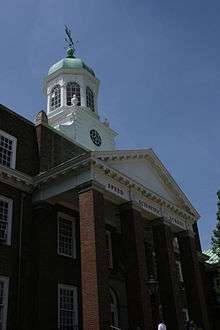James Breckenridge Speed
James Breckenridge Speed (alternatively James Breckinridge Speed) was an American corporate executive, entrepreneur, and philanthropist based in Louisville, Kentucky. He served as the President of the Louisville Railway Company and over the course of his life founded and led multiple public companies including the Louisville Cement Company and the Ohio Valley Telephone Company.
James Breckenridge Speed | |
|---|---|
| Born | January 4, 1844 Boonville, Cooper County, Missouri, USA |
| Died | July 7, 1912 (aged 68) Rockland, Knox County, Maine, USA |
| Spouse(s) | Virginia Speed |

Early life and family
Although he was born 4 Jan 1844 in Missouri and only came to Louisville as an 11-year-old, James B. Speed was raised there by aunt Lucy Fry Speed, thus always considered a Louisvillian. His parents and siblings were all born in Louisville, and his family was the famous and powerful Speed family, which had had a great impact on the city. His uncle, also a James Speed, was United States Attorney General in Abraham Lincoln second term Cabinet and for a short time Andrew Johnson's.[1]
Career
James B. Speed was a financial leader who strongly influenced Louisville's development. He helped to establish Louisville's street railway system, and became the president of the Louisville Railway Company. He saw early how significant cement would be in the growth of America, and he became the president of the Louisville Cement Company. He developed and operated large coal interests, and served as president of the Ohio Valley Telephone Company.
Philanthropy
As a philanthropist he donated a statue of Abraham Lincoln, which stands in the State Capitol, and he helped to establish and maintain several schools. After his death, his wife, Hattie Bishop Speed and his children William S. Speed and Olive Speed Sackett, set up a foundation in his name which helped to found the Speed Art Museum and the J. B. Speed School of Engineering of the University of Louisville.
Death
Speed died in 1912 in Rockland, Maine, where he spent his summers, and he was buried in Cave Hill Cemetery in Louisville.
References
- Phelps, Shirelle; Lehman, Jeffrey, eds. (2005). "Speed, James". West's Encyclopedia of American Law (Volume 9, 2nd ed.). Detroit, MI: Gale. pp. 272–273.